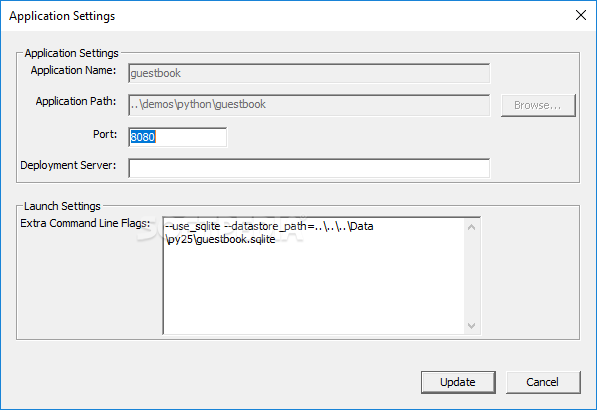
- Python version of google app engine sdk install#
- Python version of google app engine sdk archive#
- Python version of google app engine sdk windows 10#
- Python version of google app engine sdk code#
Python version of google app engine sdk code#
Source Code for repackaged APIs stubs jarĪpp Engine Java various local development utilities and devappserver.Implementation of all the App Engine APIs for local environment (devappserver)Īnd local testing of an application before deployment. Latest javadoc.io API Javadocs from this repositoryĪpp Engine Java local development implementation of the APIs.Source code for all public APIs for .* packages. Modules ending with * are only used on the production server side.

Orange items are public modules artifacts and yellow are internal ones. Soon we will stop entirely pushing internal 1.9.xx artifacts and encourage all App Engine customers to use the new artifacts built from the GitHub project. The open source release mechanism used with this GitHub repository is using the version starting at 2.0.x. On Maven Central, the released artifacts from the internal source repository are using the versions like 1.9.xx. This repository is the open source mirror of the Google App Engine Java source code that was used to produce Maven artifacts and runtime jars.

The shared code base is also used for GAE Java 11 and Java 17 build and test targets, using GitHub actions: Jdk8, but using a JDK11 or JDK17 is also possible. Prerequisites Use a JDK8 environment, so it can build the Java8 GAE runtime. Standard environment, the production runtime, the AppEngine APIs, and the local SDK. This repository contains the Java Source Code for Google App Engine With a fresh installation of SDK, the first step is typically to run the gcloud init command to authorize access to GCP project and create a new configuration with a set of base setings.Google App Engine Standard Environment Source Code for Java 8, Java 11 and Java 17. You need to run activate base to activate your base environment before run the gcloud commands. This is causes by the Anaconda environment initialization. You might see the error message as shown below: bashrcĪfter finishing above three steps, you run gcloud -help to make sure everything works. manually add export PATH="/path/to/google-cloud-sdk/bin:$PATH" to.manually add path\to\google-cloud-sdk\bin to the PATH environmental variable.Add the Cloud SDK bin folder to your PATH environment:.Extract the contents of the file to any location on your file system.
Python version of google app engine sdk archive#


Set up CLOUDSDK_PYTHON Environmental Variable
Python version of google app engine sdk install#
You can follow this post to install and quick-start Anaconda. If you have not used Anaconda yet, I also highly recommend you to try it out. If you are still using Python2, I highly recommend you to change to Python3 now. In order to use an existing Python on your systems, especially, the Python is managed by Anaconda, you might need to follow the process described in this post to make things work. Google Cloud SDK needs Python, however, its bundled Python package is still 2.7 and most of the Cloud SDK components already switch to Python 3 since version 274.0.0. Thus it doesn’t need to run any installer on your system. Each of the versioned archive has a self-contained Cloud SDK packages in a directory that can be copied to any location on your file system. Installing through versioned archives might be the best way for non-interactive installation of a specific version of the Cloud SDK.
Python version of google app engine sdk windows 10#
The process has been tested on both Windows 10 and Ubuntu 18.04. This post describes the process of installing the Cloud SDK through versioned archive on operating systems that have already installed Python through Anaconda. You can install the Cloud SDK through many options, including versioned archives, installer, apt-get/yum for Linux distro, and even Docker image. As a power user of Google Cloud Platform, you definately need to use gcloud, gsutil and bq commands to work with GCP, which means you need to install Google Cloud SDK on your local computer.


 0 kommentar(er)
0 kommentar(er)
